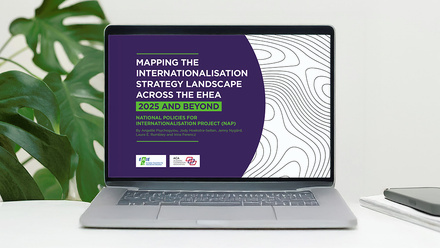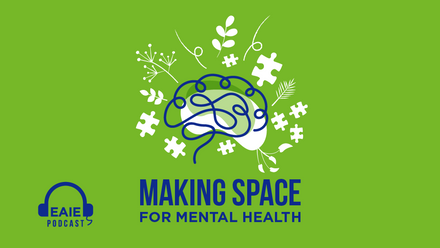Supporting international students in times of crisis and conflict

At this fraught time for many in our higher education communities, we have both a moral and an academic duty to lead and support those affected most acutely by national and international crises like the war in Ukraine. Responding effectively and meaningfully to immediate support issues is crucial, as is taking a more considered approach to coordinating our responses across our institutions and sectors. Following are some key issues and action points to consider.
Constituents and scope of work
It’s vital to first determine who is affected and the scope of support and guidance that’s needed. In relation to the current invasion of Ukraine, affected individuals may include:
- Nationals of Ukraine, Russia and Belarus, who work or are currently enrolled at your institution, or are at any point along the applicant journey (degree students as well as exchange/study abroad).
- Any other nationals sent by your university on any form of study abroad/work placement/research partnership and who may be studying in countries directly affected by this conflict.
- Also affected, but more indirectly, may be students of countries bordering Russia and Ukraine.
Our internationalised universities need to provide support to all affected students and staff, whilst being mindful of the potential for hostilities between student groups on our campuses. Currently, our responsibility to offer a safe and inclusive learning environment extends also to our Russian students, many of whom we know are feeling very fearful and isolated at this time.
Direction from university leadership, government, and ministries
With crisis communication, it is important that your university’s response is both considered but also swift, offering leadership in the form of an official statement, as this will set the tone for subsequent communications and for the organisation of an institution-wide package of support.
Senior leadership statements will normally take into consideration any steering that comes from government and specifically the Ministry of Education; they will also be mindful of the impact of the official statement and political stance that it takes upon the university’s international partnerships. Senior leadership are well placed to sponsor and steer university-level crisis response teams so that policy decisions can be reached swiftly to unlock the provision of practical support solutions.
Communications to staff and students
Most universities will have teams dedicated to communicating information to students and staff. Sending an initial message of solidarity and support is an important first step to reassure students who are far from home and worried about their families and friends. As your institution begins to build a package of support, keeping up a regular dialogue with affected students will enable you to both understand students’ anxieties and provide reassurance of the steps being taken to help them.
Sending a message of solidarity and support is an important first step to reassure students who are far from home and worried about family and friends
Examples of support might be regular face-to-face meetings with students directly affected by the conflict, newsletters and WhatsApp groups to bring students together to share information. These groups may well be student-led, particularly if you have active student representation groups or societies. It will also be crucial to keep the wider campus community up to date on what your institution is doing to support students affected by conflict; a centralised website with FAQs is a useful tool.
Prospective students and applicants
Given that some prospective students may be facing loss of access to language tests or academic documentation, your institution may wish to consider how your policy on accreditation of prior learning, which you may already use to increase access to students from disadvantaged backgrounds, including those seeking asylum in your country, may apply in these cases. For students who are mid-way through studies in conflict zones and wanting to continue at your institution, it’s important to be mindful about the risks of brain drain. In all cases, it is important to work closely with schools and admissions offices to identify ways to support students’ entry to study.
With some students facing disruption to planned funding to cover international studies, there will be an increased need for scholarships and flexibility regarding payment deadlines for tuition and/or campus accommodation fees. Meanwhile, disruption to visa services or changes in visa requirements for nationals from affected countries may affect students’ ability to arrive in time for the start of physical classes, so the option for remote study may need to be considered.
Students currently at your institution
Students already located on campus will have other kinds of needs. Anxiety and mental health problems may be at the top of this list, with students worried about family back at home and for their own future, or fearing hostility on campus. Work with your well-being services/counselling and guidance teams to ensure one-on-one support and/or group sessions for students. General communications can make vulnerable groups aware of how to access support, while specific communications can be targeted to students identifying themselves as at-risk, being mindful of their need to retain a high level of confidentiality.
Other important issues include ensuring that there is a message of zero tolerance of bullying or harassment and providing support through university services to any affected student or member of staff, as well as being aware of the need for parity across all groups affected. Counsellors and mental health specialists should prioritise those most affected and ensure referral to external agencies, where appropriate.
To address matters of students’ academic performance being affected as a result of the crisis/conflict, work with academic leadership to ensure that concessions and accommodations are made for students affected. Ensure that the process for requesting such concessions is straightforward, generous, light-touch and well-publicised – if students are required to jump through complex hoops to demonstrate how their academic performance has been affected by the war, the good intentions of the concession are severely undermined.
There will be an increased need for hardship funding and scholarships and extensions/concessions on tuition/accommodation payment deadlines. Working with careers services and student unions to provide employment advice for students will be important.
Some students will face immigration issues, for example with their visas due to expire but it is unsafe to return home, or needing to exit your country to apply for visas for further study or graduate work but they cannot leave your country safely. Other students will want advice on asylum applications and family reunification. For these cases, work closely with your sector representatives to lobby for sensible and humane visa concessions.
Students may face expiring accommodation contracts at a time when it is unsafe for them to return home
When it comes to accommodation, students may face the inability to continue to pay accommodation costs and expiring accommodation contracts at a time when it is unsafe for students to return home. Here, it will be important to offer sectoral/government level recommendations to university and private accommodation providers to show leniency toward affected students.
Students in affected countries
Your institution will need to work with government departments and international education partners as well as relevant insurance teams to locate and arrange for the safe and swift relocation of students back to their home countries or to campus/your country. For students facing disruption of academic studies linked to mobility placements, alternative ways of enabling students to meet learning objectives required to complete their degree programme will need to be identified.
Looking ahead
Our institutions’ response to international crises, such as the war in Ukraine, will have long-term implications for the global reputation of the higher education sector and on the lives of many individual students and staff. Our commitment to higher education as a force for building greater understanding and peace will need to be exemplified in our support for students and staff affected not only by the war in Ukraine, but all other wars.
Our commitment to higher education as a force for building greater understanding and peace will need to be exemplified in our support for students and staff






